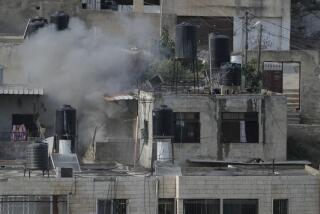Guerrilla Says Raid Aimed to Kill Civilians : Israel: Remarks conflict with reports by military officials, who say bases, embassy were targeted.
- Share via
JERUSALEM — Israel released contradictory versions Tuesday of the purpose of last week’s foiled Palestinian raid from the sea, adding a bizarre postscript to the guerrilla attack and perhaps complicating the diplomatic response of the United States.
Authorities released an interview with one of the Palestinian commandos, identified as Mohammed abu Shaash, who said he was under orders to assault the Sheraton Hotel in Tel Aviv and shoot indiscriminately.
“The goals of the operation were to kill civilians in the hotel area of Tel Aviv. We were supposed to shell it from the sea with Katyusha rockets and 23-millimeter and 14.5-millimeter shells and then land and kill anyone we came across. I was told to go to the Sheraton Hotel,” Abu Shaash said in a televised interview.
The comments conflicted sharply with the assessment of Israeli military authorities who told members of Parliament that the raid was probably meant to hit Israeli army installations and the U.S. Embassy in Tel Aviv. The embassy was to be attacked at dawn, a time when there would be few people in the beachfront building.
The assault on the U.S. Embassy was aborted when speedboats malfunctioned, the officials concluded.
Israeli security forces killed four of the Palestinian commandos and captured 12 others. No Israeli soldiers or civilians were hurt.
The Israeli military officials said the raiders were given specific orders not to attack civilians. The commandos appeared to deliberately avoid killing civilians at their only landfall, at Nizzanim, a popular public beach.
There was no explanation given for the difference between the one commando’s confession of terrorist intent and the official view that the raid was a military operation. The official assessment puts Israeli analysts on the side of Mohammed Abbas, also known as Abul Abbas, who heads the Palestine Liberation Front. He said the raid was not directed at civilians.
“It is believed he is telling the truth,” government radio said.
Both Libyan leader Moammar Kadafi and PLO Chairman Yasser Arafat knew about the raid, Israeli officials added, contradicting their military intelligence chief, Maj. Gen. Amnon Shahak, who said in a newspaper interview published last Friday that authorities had no evidence that Arafat did know.
Libyan officials also have denied that their country had any role in the raid.
The Bush Administration is investigating the intent of the raid, which was carried out by a faction of the Palestine Liberation Organization. Officials in Washington say that, if the attack was a raid meant to harm civilians, the 18-month dialogue between the United States and the PLO may be called off.
The Administration maintained the dialogue in part on the basis of a PLO promise to abandon terrorism. Israel has called for suspension of the talks and dismissal of the PLO as a candidate to take part in proposed peace negotiations over the fate of the Israeli-held West Bank and Gaza Strip.
Washington had been trying to set up talks between Israel and a Palestinian delegation that would include PLO followers. The proposal was rejected by the government of Prime Minister Yitzhak Shamir.
Abu Shaash, in his televised interview, said that a Libyan naval officer, Col. Zuhayr, accompanied the commandos on the mother ship that transported the raiders and their speedboats to the Israeli coast. The guerrillas had reportedly received training from instructors in Libya.
The guerrillas were told that, if captured, “no one should admit where we had been trained, who helped us and who supplied us with the boats and weapons. We were told we must not admit this under any circumstances,” Abu Shaash said.
There has been public speculation here that Israel might strike back at Libya for its role in the raid or take its wrath out on Palestinian bases in Lebanon.
More to Read
Sign up for Essential California
The most important California stories and recommendations in your inbox every morning.
You may occasionally receive promotional content from the Los Angeles Times.













